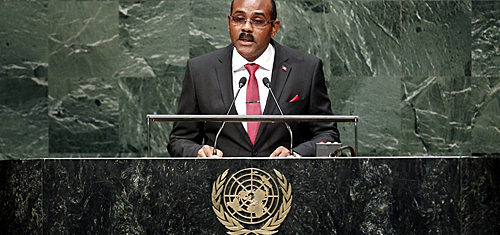 Antigua’s Prime Minister Gaston Browne has told the United Nations that his country’s online gambling dispute with the United States demonstrates that “might is right” when it comes to international trade obligations.
Antigua’s Prime Minister Gaston Browne has told the United Nations that his country’s online gambling dispute with the United States demonstrates that “might is right” when it comes to international trade obligations.
On Thursday, Browne addressed the 70th Session of the UN General Assembly Debate, reminding delegates that it had been 11 long years since the World Trade Organization (WTO) had ruled in favor of Antigua in the trade dispute. Yet the US has failed to respond in any meaningful way to the ruling, leading Browne to echo Martin Luther King’s maxim that “justice delayed is justice denied.”
Back in 2003, Antigua filed a complaint with the WTO, arguing that the US’ refusal to allows Antigua-licensed online gambling operators access to the US market was in breach of America’s trade obligations. The WTO agreed with Antigua, telling the US it couldn’t block international online operators while simultaneously permitting US horseracing interests to conduct online advance deposit wagering.
Given the option of either allowing access by Antiguan operators or curtailing its online horse betting operations, the US chose to do neither. The WTO said the status quo was unacceptable and ordered the US to pay an annual $21m in penalties until the matter was resolved. But the US has to date paid Antigua nothing, creating a total outstanding debt of over $200m.
Since assuming office in 2014, Browne has attempted to bring the US back to the bargaining table, offering significant concessions that would have reduced the US’ outstanding obligation to Antigua by more than half. The parties were recently said to be making progress on resolving their longstanding differences but have yet to announce any formal agreement.
In his second speech to the UN since taking office, Browne lamented Antigua’s inability to compel “a larger and vastly richer country” to live up to its international trade obligations. Given America’s apparent disinterest in honoring these obligations, Browne said Antiguans “are entitled to conclude that the powerful continue to ignore and trample the rights of the weak and that might is right.”
Browne criticized the international trading system for treating Antigua with “benign neglect” and said international rules “should not be overturned by bigger countries that seek to impose their will on smaller ones.” Such a stance is “not fair; it is not just; it is not democratic and it is patently wrong.”
Browne said Antigua – and other small nations in similar circumstances – “are not looking for handouts. We do not want to endure the indignity of begging. What we want is a chance to develop a chance to improve the living standards of our people.”






